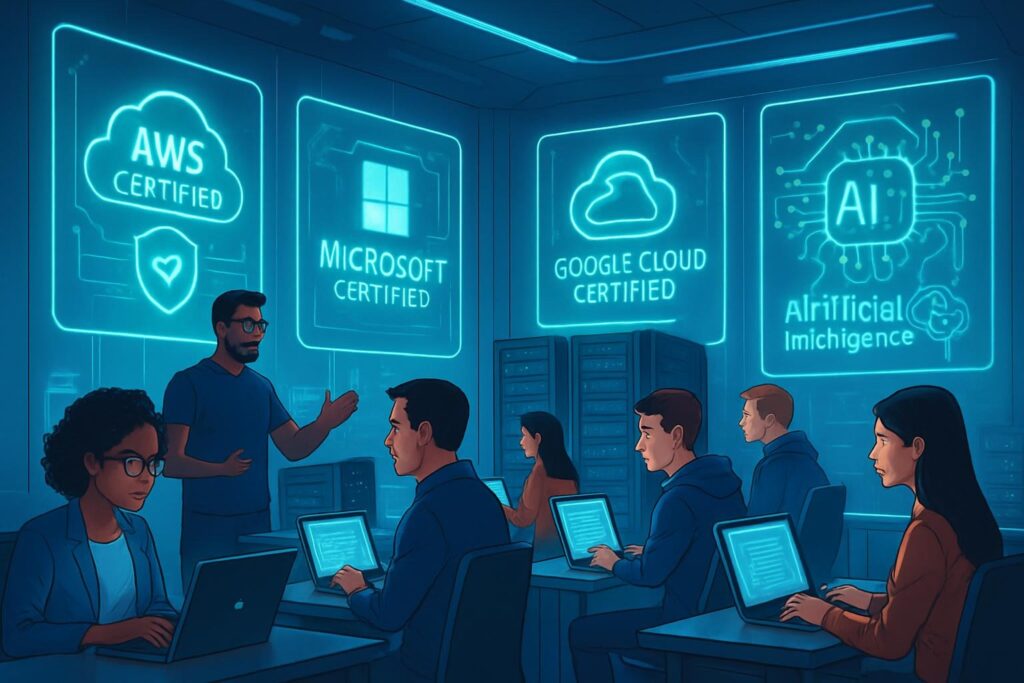
In the rapidly evolving world of technology, staying ahead requires more than just experience—it demands proof of expertise. For IT professionals, certifications serve as a recognized standard that validates skills, improves job prospects, and opens doors to promotions and higher salaries. In 2025, the importance of IT certifications has never been greater as industries adopt artificial intelligence, cloud computing, and cybersecurity measures at an unprecedented pace. This article explores the best certifications for IT professionals this year, analyzing their global demand, career benefits, and return on investment.
Why IT Certifications Still Matter in 2025
Some professionals question whether certifications hold as much value in today’s skill-driven market. The reality is that certifications continue to carry significant weight. According to a World Economic Forum report, nearly 50% of employees will need reskilling by 2027. Certifications provide structured learning, standardized testing, and official recognition—making them an indispensable tool for both career changers and seasoned IT experts. Employers often use certifications as a filtering mechanism during hiring, ensuring candidates meet industry standards.
Top Technical Certifications for 2025
Below is a detailed list of the most in-demand certifications across IT domains:
1. AWS Certified Solutions Architect – Associate
Cloud computing continues to dominate IT, and Amazon Web Services (AWS) leads the pack. The AWS Certified Solutions Architect – Associate certification is one of the most sought-after credentials for cloud professionals. It validates the ability to design scalable systems, optimize costs, and secure cloud-based applications.
- Cost: $150
- Difficulty: Moderate
- Average Salary: $120,000+ annually
- Official AWS Certification Page
2. Microsoft Certified: Azure Administrator Associate
For professionals working with Microsoft environments, Azure certifications are critical. The Azure Administrator certification demonstrates skills in managing cloud services, storage, virtual networking, and computing capabilities within Microsoft Azure.
- Cost: $165
- Difficulty: Moderate
- Average Salary: $110,000 annually
- Microsoft Certifications
3. Google Cloud Professional Cloud Architect
Google Cloud is increasingly popular among enterprises. The Professional Cloud Architect certification verifies a professional’s ability to design, develop, and manage secure and scalable cloud infrastructure on Google Cloud Platform (GCP).
- Cost: $200
- Difficulty: Moderate to High
- Average Salary: $115,000+ annually
- Google Cloud Certifications
4. CompTIA Security+
With cyber threats escalating worldwide, Security+ remains a gold standard for entry to mid-level cybersecurity roles. It covers network security, threat management, risk mitigation, and compliance practices.
- Cost: $392
- Difficulty: Moderate
- Average Salary: $95,000 annually
- CompTIA Security+ Certification
5. Certified Information Systems Security Professional (CISSP)
The CISSP certification, offered by (ISC)², is globally recognized for advanced-level cybersecurity professionals. It demonstrates expertise in designing and managing security programs, making it ideal for those aiming for leadership roles.
- Cost: $749
- Difficulty: High
- Average Salary: $150,000+ annually
- CISSP Official Site
6. Certified Ethical Hacker (CEH)
Ethical hacking is crucial as companies proactively identify vulnerabilities. The CEH certification validates penetration testing and ethical hacking skills, equipping professionals to secure networks effectively.
- Cost: $1,199
- Difficulty: High
- Average Salary: $105,000 annually
- EC-Council CEH Certification
Business & Management Certifications
Beyond technical skills, IT professionals benefit from certifications that strengthen project management and business knowledge. These include:
1. Project Management Professional (PMP)
Offered by the Project Management Institute (PMI), PMP is recognized globally and validates project management expertise. IT professionals with PMP certification are often considered for leadership positions.
- Cost: $405–$555
- Difficulty: High
- Average Salary: $130,000 annually
- PMP Official Page
2. ITIL 4 Foundation
ITIL (Information Technology Infrastructure Library) is vital for professionals in IT service management. The ITIL 4 Foundation certification focuses on modern digital and IT service management practices.
- Cost: $200–$400
- Difficulty: Low to Moderate
- Average Salary: $90,000 annually
- ITIL Certifications
How to Choose the Right Certification
Choosing the right certification depends on your career goals, current skill set, and industry trends. Some guiding questions include:
- Am I aiming for a technical or managerial role?
- Do I want to specialize (e.g., cybersecurity) or broaden my expertise (e.g., project management)?
- What is my budget and how much study time can I commit?
- Is the certification recognized globally or only regionally?
Internal Resources to Help You Prepare
- 10 Common CV Mistakes and How to Fix Them
- How to Write a Winning Cover Letter
- Job Interview Tips
- How to Negotiate Your Salary with Confidence
- Top Job Search Strategies That Actually Work
Expanded FAQs
1. Are IT certifications worth the cost in 2025?
Yes. Certifications validate your expertise and can significantly increase job opportunities and salaries. For instance, cloud certifications alone are projected to boost earnings by 20–30%.
2. Which IT certification pays the highest salary?
CISSP and PMP remain among the highest-paying, often exceeding $150,000 annually depending on location and experience.
3. How long does it take to prepare for IT certifications?
Preparation time varies: entry-level certifications (CompTIA Security+) may take 2–3 months, while advanced certifications like CISSP often require 6–12 months of study and work experience.
4. Do certifications guarantee a job?
No certification guarantees employment, but it enhances credibility and helps you stand out among candidates with similar experience.
5. Should I pursue multiple certifications?
Yes, but strategically. It’s better to pursue a combination of complementary certifications (e.g., AWS + Security+) rather than multiple overlapping credentials.
6. Are free IT certifications available?
Yes. Some platforms, like Google and Coursera, offer free or low-cost certifications. However, recognized credentials from CompTIA, AWS, or Microsoft usually carry fees.
7. Which certification is best for beginners?
CompTIA A+ and CompTIA Security+ are excellent starting points for entry-level IT professionals.
8. How do certifications impact remote job opportunities?
Certifications improve remote job prospects by proving verifiable skills, especially in high-demand fields like cloud computing and cybersecurity.
9. Can certifications expire?
Yes. Many certifications, like Security+ and PMP, require renewal every 2–3 years through continuing education or retesting.
10. Is it better to specialize or generalize in IT certifications?
It depends on career goals. Specialization leads to niche roles with higher salaries, while generalization offers flexibility across industries.
Final Thoughts
For IT professionals, certifications are more than credentials—they are career accelerators. Whether you aim to specialize in cybersecurity, dominate the cloud ecosystem, or transition into IT management, the right certification can help you achieve your goals. In 2025, the demand for certified professionals will only continue to rise, making now the best time to invest in your skills and future.



